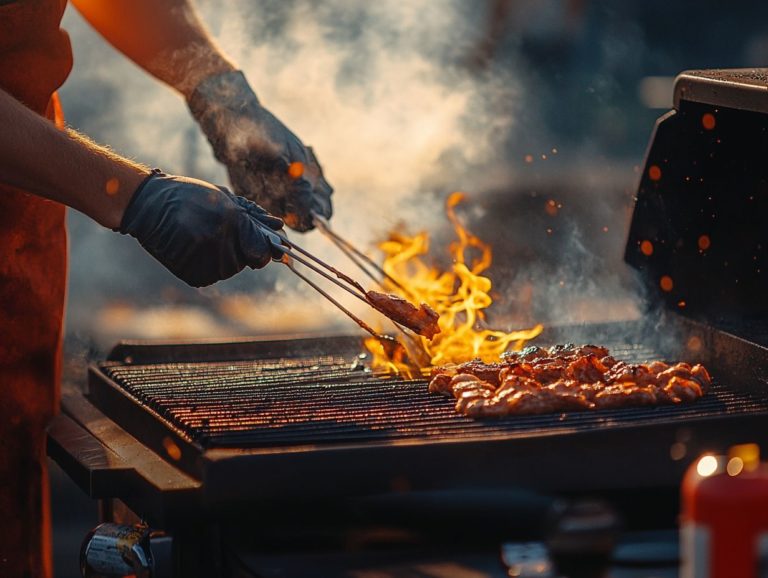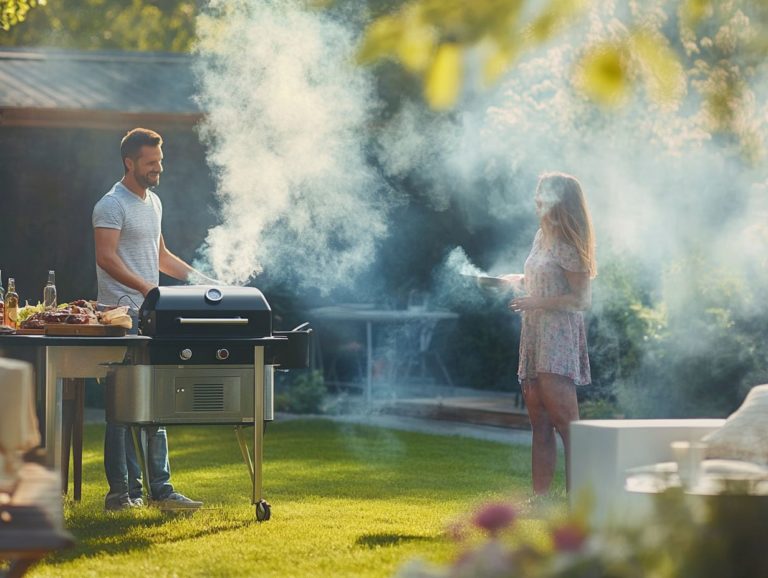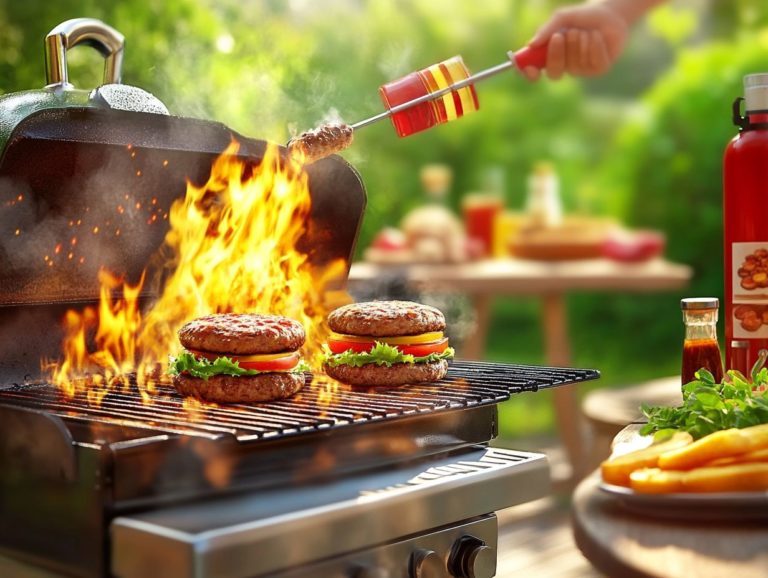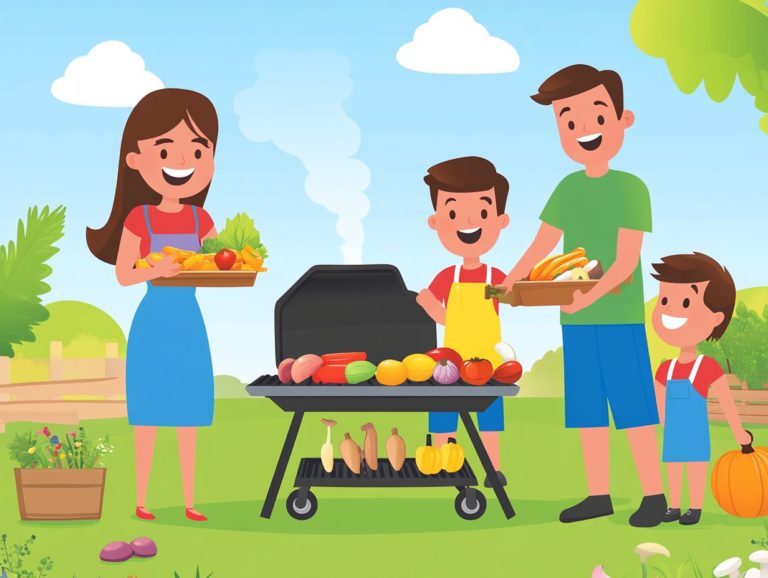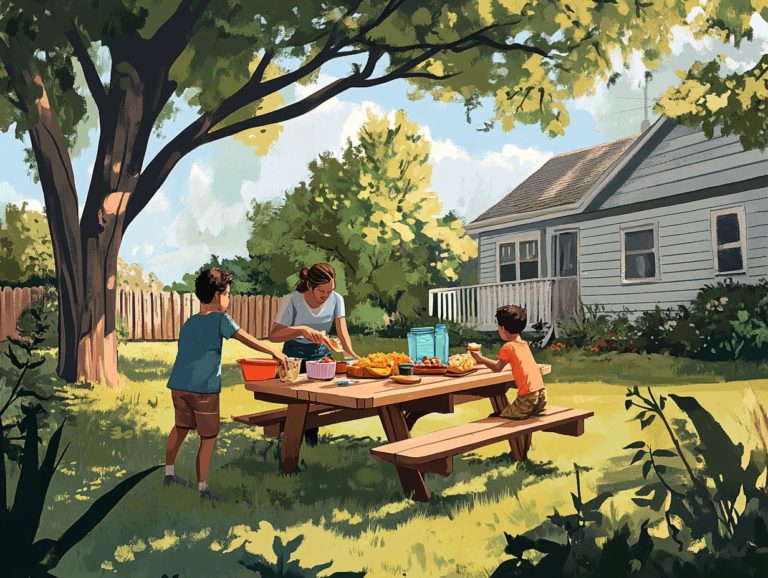Top Outdoor Cooking Safety Tips for Beginners
Grilling season is a time of joy and tantalizing flavors. You must prioritize safety to enjoy a fun and worry-free grilling season.
Whether you’re a seasoned pro or just starting out, understanding best practices can prevent accidents and enhance your cooking experience.
From having a fire extinguisher at the ready to following proper food safety measures, this guide gives you the tools to grill confidently and safely!
Explore the tips and tricks that will ensure you and your loved ones remain safe while savoring every delicious moment!
Contents
- Key Takeaways:
- 1. Always Have a Fire Extinguisher on Hand
- 2. Keep a Safe Distance from Flammable Objects
- 3. Use Proper Equipment and Tools
- 4. Never Leave the Grill Unattended
- 5. Keep Children and Pets Away from the Grill
- 6. Use Proper Food Handling and Storage Techniques
- 7. Check for Gas Leaks Before Using a Gas Grill
- 8. Avoid Wearing Loose Clothing
- 9. Always Follow Manufacturer’s Instructions
- 10. Keep a Clean and Organized Cooking Area
- 11. Do Not Use the Grill in Enclosed or Covered Spaces
- 12. Be Mindful of Weather Conditions
- 13. Properly Dispose of Hot Coals
- 14. Have a First Aid Kit Available
- 15. Practice Fire Safety at All Times
- What Are the Most Common Causes of Grill-Related Accidents?
- Frequently Asked Questions
- Ready to grill safely? Here are top tips for beginners!
- How can I ensure food safety while cooking outdoors with insights from professionals like Melissa Wright?
- What should I do if a grease fire occurs on my grill?
- Are there any safety precautions I should take when using a charcoal grill?
- What are some general tips for a safe outdoor cooking experience?
- What are some precautions to take when cooking outdoors in extreme weather conditions, particularly if using a grill in Salt Lake City?
Key Takeaways:
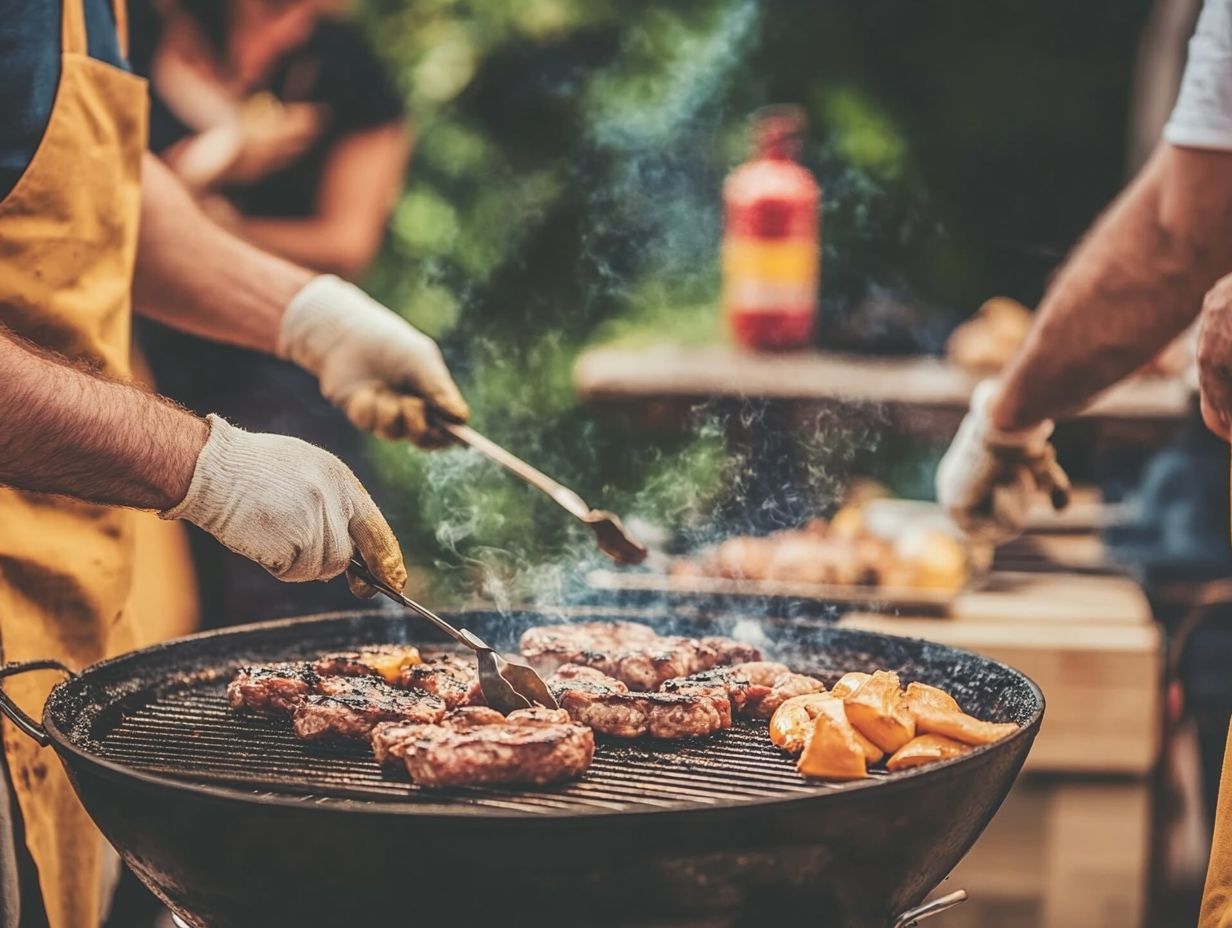
- Always have a fire extinguisher on hand in case of emergencies.
- Keep a safe distance from flammable objects to avoid accidents.
- Use proper equipment and tools to ensure safe and efficient cooking.
1. Always Have a Fire Extinguisher on Hand
When you’re hosting backyard cookouts or potlucks, safety should be at the forefront of your mind. One of the most crucial safety measures is having a fire extinguisher readily accessible to handle any potential flare-ups while grilling.
Fire extinguishers are crucial for safety. They prevent serious accidents during grilling, cooking raw meats, or preparing cold dishes outdoors.
Approximately 10,000 home fires erupt each year due to grilling accidents. Selecting the right fire extinguisher is key. Opt for a fire extinguisher designed for flammable liquids and grease fires, as these are often the culprits behind grilling mishaps.
Placement is essential. Keep the extinguisher within arm’s reach but away from the grilling area to ensure quick access without obstruction.
Regularly check the extinguisher s pressure gauge to ensure it works. Keep it clean and unobstructed.
Being prepared with the right equipment creates a safer environment and enhances the overall enjoyment of your outdoor gatherings. Make your gatherings safer check your fire extinguisher now!
2. Keep a Safe Distance from Flammable Objects
Maintaining a safe distance from flammable objects is essential for preventing accidents during your backyard cookouts. Items like napkins, paper towels, and clothing can ignite easily when near a grill or open flame.
In addition to these common hazards, be vigilant about lighter fluid, grease, and certain types of decorations that can catch fire. Establishing a designated cooking zone keeps these materials away from the grill and creates a safe space for everyone to enjoy.
This area should be clearly marked. Remind everyone about fire safety practices, such as keeping a fire extinguisher nearby and ensuring that children remain at a safe distance. By organizing your cookout space thoughtfully, you can significantly reduce fire risks and guarantee a fun, safe experience for all.
3. Use Proper Equipment and Tools
Using proper equipment and tools, like a tool to check if meat is cooked properly, is essential for ensuring food safety and hygiene during any potluck or outdoor cooking event.
Along with thermometers, a sturdy pair of heat-resistant gloves is vital for handling hot dishes. These gloves allow you to maneuver steaming pots or sizzling grills without the risk of burns.
For storing colder items, insulated containers help maintain safe temperatures and reduce the risk of foodborne illnesses. Tongs and spatulas designed for grilling can also aid in safely flipping and serving food, ensuring a smooth grilling experience.
By utilizing the right tools and equipment, you enhance the enjoyment of shared meals while prioritizing health and safety for everyone involved.
4. Never Leave the Grill Unattended
Grill safety takes a nosedive when you leave the grill unattended. This can lead to potential fire hazards and the unfortunate reality of overcooked or burnt food definitely a mood killer for any backyard cookout or potluck.
There have even been reports of unattended grills igniting significant fires, causing property damage and endangering lives. A common scenario involves a flare-up due to grease buildup, which can easily occur if the grill isn’t monitored. To keep these risks at bay, it s vital to have at least one person committed to overseeing the grilling process.
Engaging friends or family makes the event more enjoyable and distributes responsibility. Setting a timer for intervals can serve as a helpful reminder for everyone to check on the grill periodically, ensuring that both safety and delicious flavor remain top priorities.
5. Keep Children and Pets Away from the Grill
Safety during backyard cookouts is essential. It’s crucial to keep children and pets at a safe distance from the grill. This protects them from burns and accidents and allows you to focus on crafting those delicious hot and cold dishes without distractions.
Consider establishing a designated safe zone to significantly reduce the risk of mishaps. You might set up a barrier or use outdoor furniture to create a clear area away from the grilling space.
Communicating grill safety guidelines is vital, especially when hosting guests with young children or pets. Inform them about the boundaries and the importance of supervising their little ones and furry companions.
This open dialogue fosters a safer environment, ensuring that everyone can enjoy the cookout while minimizing potential hazards.
6. Use Proper Food Handling and Storage Techniques
Employing proper food handling and storage techniques is essential during your outdoor cooking sessions, especially at potlucks or backyard cookouts. This practice reduces the risk of foodborne illnesses that can result from mishandled raw meats or prepared dishes, ensuring the health and safety of everyone involved.
Frequently wash your hands with soap and water especially after touching raw ingredients to maintain a clean cooking environment. It s equally crucial to use separate cutting boards for raw meats and vegetables to prevent mixing raw and cooked foods.
Keep prepared dishes at safe temperatures, ideally below 40 F or above 140 F, to protect against harmful bacteria. By understanding and practicing these food hygiene principles, you foster a healthier dining experience and inspire pride in everyone s culinary contributions.
7. Check for Gas Leaks Before Using a Gas Grill
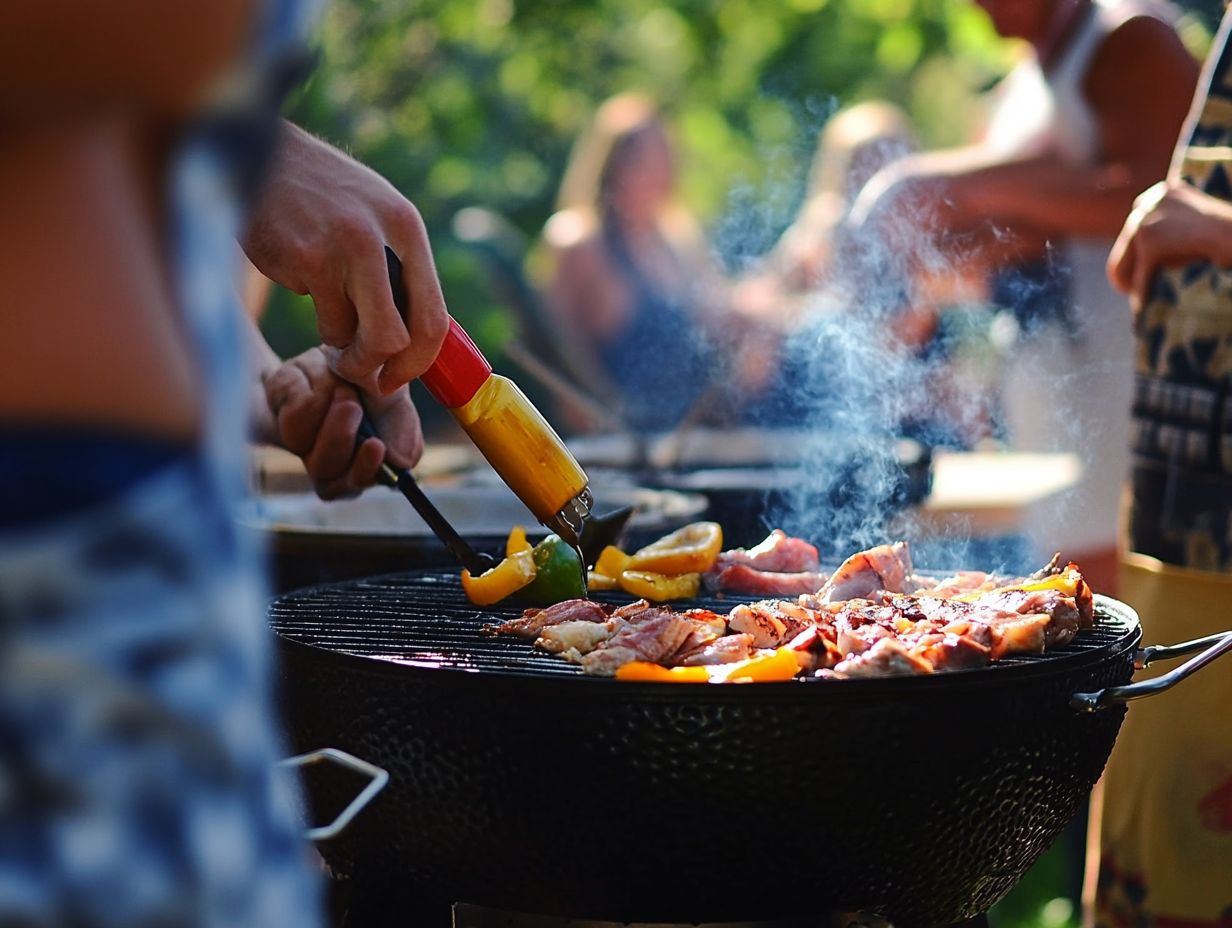
Before you fire up that gas grill for your next backyard cookout, it’s vital to check for gas leaks. This enhances your grill safety and paves the way for a seamless cooking experience as you whip up those mouthwatering hot dishes.
To carry out this vital check, start by inspecting the hoses and connections for any visible signs of wear or damage these could indicate a potential leak. Mix soap with water and apply it to the joints and hoses to check for leaks; look for bubbling as a sign of gas escaping.
Also, listen for hissing sounds near the grill or detect any pungent odors resembling rotten eggs both are telltale signs of a leak. Remember, regular maintenance and inspections of your grilling equipment are crucial for preventing accidents and ensuring a safe, enjoyable cooking environment for everyone involved.
8. Avoid Wearing Loose Clothing
Wearing loose clothing while grilling can present a serious fire hazard. It significantly increases the chances of catching fire from the grill flames. Make sure to wear fitted clothes for your safety!
Opt for snug-fitting tops and bottoms made from natural fibers like cotton or linen. This choice not only keeps you safe from accidental flames but also ensures comfort in warmer outdoor settings. Avoid long, dangling sleeves and loose aprons; they can easily brush against hot surfaces and pose a risk.
When it comes to footwear, practicality is key. Non-slip options provide the stability you need while navigating a potentially hazardous cooking area.
Consider wearing a fitted hat or tying back long hair to keep it safely away from the grill. This simple precaution can contribute to a more successful and enjoyable potluck or family gathering.
9. Always Follow Manufacturer’s Instructions
Following the manufacturer’s instructions for your grill is crucial for maintaining safety and achieving the best results. This is especially important when cooking raw meats or prepared foods during your backyard cookouts, as knowing what to do in case of an outdoor cooking accident can help ensure a safe cooking experience.
By assembling the grill according to the specific guidelines, you can avoid problems that often stem from improper setup. This is particularly true when using different fuel types such as charcoal or propane.
Choosing the right fuel type be it charcoal, propane, or wood pellets plays a vital role in achieving the perfect flavor and temperature control.
Understanding the grill s temperature settings enables you to cook with precision. This ensures meats are grilled to the ideal doneness and enhances the overall quality of your dishes. These practices significantly improve grill safety and minimize the risks of flare-ups or uneven cooking.
10. Keep a Clean and Organized Cooking Area
A clean and organized cooking area is vital for maintaining food hygiene during potlucks or backyard cookouts. It minimizes the risk of cross-contamination, ensuring that raw meats and prepared foods are handled safely.
This focus on cleanliness elevates the overall dining experience and protects your guests from potential foodborne illnesses. Regularly wipe down countertops with antibacterial solutions to eliminate harmful bacteria lurking in unseen corners.
Keep all your cooking tools and utensils sanitized to prevent any unwelcome transfer of germs. An organized setup, with clearly designated areas for raw ingredients and finished dishes, reduces the chances of accidents such as spills or mix-ups.
Creating a hygienic environment is essential for promoting both safety and enjoyment at any culinary gathering.
11. Do Not Use the Grill in Enclosed or Covered Spaces
Using a grill in enclosed or covered spaces can lead to serious safety hazards, including the risk of carbon monoxide poisoning, a dangerous gas that can make you very sick, and potential fires. Don t risk it! Always grill outdoors in well-ventilated outdoor areas.
To ensure a safe cooking experience, always set up your grill in a spacious outdoor location. Keep it away from flammable materials such as trees, overhanging branches, decks, or walls. Proper ventilation is key; it allows harmful gases to disperse effectively and minimizes the risk of smoke buildup. If you’re curious about more specific precautions, check out this guide on cooking over open flames, which can be particularly troublesome for anyone with respiratory issues.
Grilling away from windy areas is also smart, as it helps maintain a consistent temperature and reduces the likelihood of flare-ups. Opt for a flat, stable surface to enhance your safety and boost your cooking performance. Choose the right spot for your outdoor culinary adventures!
Follow these tips for a safe and enjoyable grilling experience!
12. Be Mindful of Weather Conditions
Being mindful of weather conditions is crucial for ensuring your outdoor cooking remains safe and enjoyable. Factors like wind, rain, and extreme temperatures can significantly impact grill safety and the overall success of your backyard cookouts.
For example, high winds can cause your grill to overheat or even lead to unwanted flare-ups, while rainy weather might dampen your charcoal or propane setup. To overcome these challenges, it’s wise to select a sheltered spot for your grill and invest in a quality grill cover to shield it from unexpected downpours.
On particularly hot days, think about adjusting cooking times and temperatures to prevent charring and ensure even cooking. To maintain the quality and safety of your food in less-than-ideal weather, always keep your ingredients chilled until just before grilling. Be vigilant about storing perishable items indoors until you’re ready to use them.
13. Properly Dispose of Hot Coals
Properly disposing of hot coals after grilling is essential for ensuring safety during your backyard cookouts. Neglecting this task can lead to fires and injuries, posing a risk to both people and property.
First, make sure the coals are completely cool. This step is vital. Even coals that appear extinguished can still harbor enough heat to ignite nearby materials. Allow the coals to cool for at least 24 hours, making certain they re no longer emitting any heat.
Once they ve cooled, gather a sturdy metal ash container specifically designed for this purpose. This container will help prevent any embers from escaping. Steer clear of using combustible materials or standard trash bags, as these simply won t withstand the heat.
It s also wise to place the container on a non-flammable surface, away from your home and any flammable substances, to further minimize the risk of accidental fires.
14. Have a First Aid Kit Available
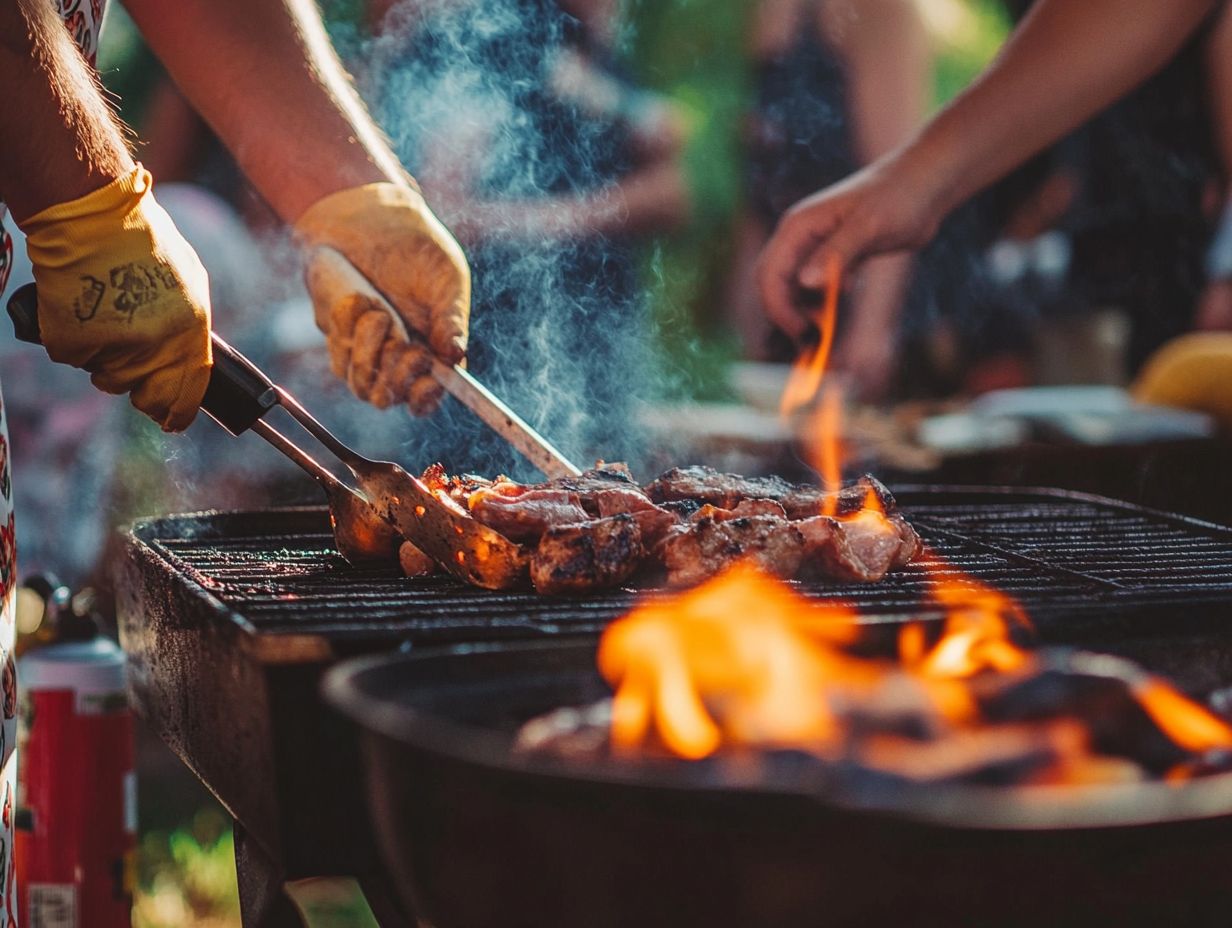
Having a first aid kit at the ready during your backyard cookouts is not just a smart idea; it s an essential safety measure that prepares you to handle any minor injuries or accidents that may arise while you’re grilling or preparing delicious food.
This proactive approach lets you handle any incidents quickly, whether it s a minor burn from the grill or a small cut from chopping vegetables, ensuring that discomfort or complications are minimized.
Essential items for your first aid kit should include:
- Adhesive bandages
- Antiseptic wipes
- Gauze and tape
- Burn cream to soothe burns
- A pair of tweezers for splinter removal
Being prepared for emergencies is crucial; a quick response can prevent minor injuries from escalating. Regarding grilling, knowing how to treat common injuries like applying cold water or ice to burns and securing cuts with clean bandages can help foster a safer, more enjoyable atmosphere for everyone involved.
15. Practice Fire Safety at All Times
Practicing fire safety during your backyard cookouts not only protects your guests but also elevates the overall enjoyment of outdoor cooking. To enhance your experience, be aware of the top risks of outdoor cooking and how to avoid them, ensuring that every moment spent preparing delicious food is a delightful experience.
To ensure your safety, it’s essential to have a fire extinguisher or a bucket of water close at hand for any emergencies. Positioning your grill on a flat, stable surface and keeping it away from flammable materials significantly reduces risks.
Constant supervision of the grill is crucial; unattended flames can escalate in the blink of an eye. Before hosting your gathering, it’s wise to devise a fire safety plan that includes setting clear boundaries around the cooking area, discussing emergency procedures with your guests, and ensuring there s an accessible route for exit if needed.
This thoughtful approach creates a safe yet enjoyable atmosphere for everyone involved. Be prepared make sure you have what you need before you hit the grill!
What Are the Most Common Causes of Grill-Related Accidents?
Understanding the most common causes of grill-related accidents is critical for enhancing your grill safety. During bustling potlucks or backyard cookouts, distractions can easily lead to accidents when handling raw meat or using grilling equipment.
Leaving the grill unattended, even for just a moment, can quickly escalate into a dangerous situation if flames flare up or spills occur. Improper food handling practices, such as mixing raw and cooked foods, pose serious health risks to your guests.
Equipment failure, like a faulty propane tank or worn-out grill parts, highlights the need for regular maintenance and inspections. By implementing prevention strategies, such as designating a responsible grill master and educating all hosts on safety protocols, you’ll dramatically lower the chances of accidents, ensuring a more enjoyable experience for everyone involved.
How Can One Prevent Grill-Related Injuries and Accidents?
Preventing grill-related injuries and accidents hinges on your comprehensive understanding of safety practices and a vigilant approach during outdoor cooking events. It’s especially important to be aware of safety tips for open flame cooking, particularly when raw meats and prepared foods are involved.
To establish a safe grilling environment, it s crucial to designate a cooking area that is at least 10 feet away from any structures or flammable materials. Before lighting the grill, check all equipment for leaks and ensure that the grill itself is clean and free of grease buildup.
While grilling, keep a watchful eye on those flames and never leave the grill unattended this is essential for avoiding mishaps. Once cooking is done, proper food storage becomes vital; guests should be informed about how to handle leftovers correctly, ensuring they are quickly cooled and stored.
Consider providing printed guidelines or a brief safety talk before you fire up the grill. This can help everyone enjoy the experience while keeping safety at the forefront.
What Are the Best Practices for Grilling Safely?
Implementing best practices for grilling safely not only preserves the integrity of the food served but also significantly reduces the risk of accidents and foodborne illnesses. By prioritizing safety measures, you can create a more enjoyable outdoor dining experience for yourself and your guests.
For instance, using a food thermometer to ensure that meats reach the recommended internal temperatures provides peace of mind, confirming that harmful bacteria have been effectively eliminated. Keeping your cooking area clean and regularly washing grilling utensils and surfaces helps prevent cross-contamination, a common culprit behind foodborne outbreaks.
Opting for sturdy and appropriate grilling equipment minimizes the potential for accidents, helping to maintain a safe and welcoming grilling environment. Additionally, avoiding common outdoor cooking mistakes safeguards health and elevates the overall quality of your meal.
What Are the Most Important Safety Tips for Using a Charcoal Grill?
When using a charcoal grill for your backyard cookouts, following best practices for outdoor cooking safety is key to ensuring a smooth cooking experience and preventing accidents while you prepare those mouthwatering dishes.
Start by handling hot coals with care to avoid burns or flare-ups. Adequate ventilation is crucial, as charcoal grilling can produce toxic fumes like carbon monoxide. Unlike gas grills, which ignite easily with a simple turn of a knob, charcoal grilling often requires lighter fluid or chimney starters for a safe startup. When preparing meals like soups or casseroles over a campfire, wait for the coals to turn gray before placing your food on the grill; this ensures proper heat distribution.
Remember these tips for a safe and enjoyable grilling experience!
Feel free to share your own grilling safety tips or experiences with others to promote safe practices!
How Can One Ensure Food Safety While Cooking Outdoors?
Ensuring food safety while cooking outdoors at potlucks and backyard cookouts is essential to prevent foodborne illnesses. Emphasizing proper food handling, temperature control (keeping food at the right temperature to prevent bacteria growth), and hygiene practices can make all the difference.
Utilizing food thermometers is a smart move to ensure that your meats reach safe internal temperatures, effectively killing off any harmful bacteria. Following procedures for clean hands and surfaces while transporting raw meats and prepared dishes is key to reducing contamination risks.
Maintaining a clean environment is crucial. Washing your hands before and after food prep is vital, along with regularly sanitizing surfaces and utensils, which greatly reduces the risk of cross-contamination. By staying vigilant with these practices, you can savor your outdoor meals without the nagging worry of food-related health issues.
Frequently Asked Questions
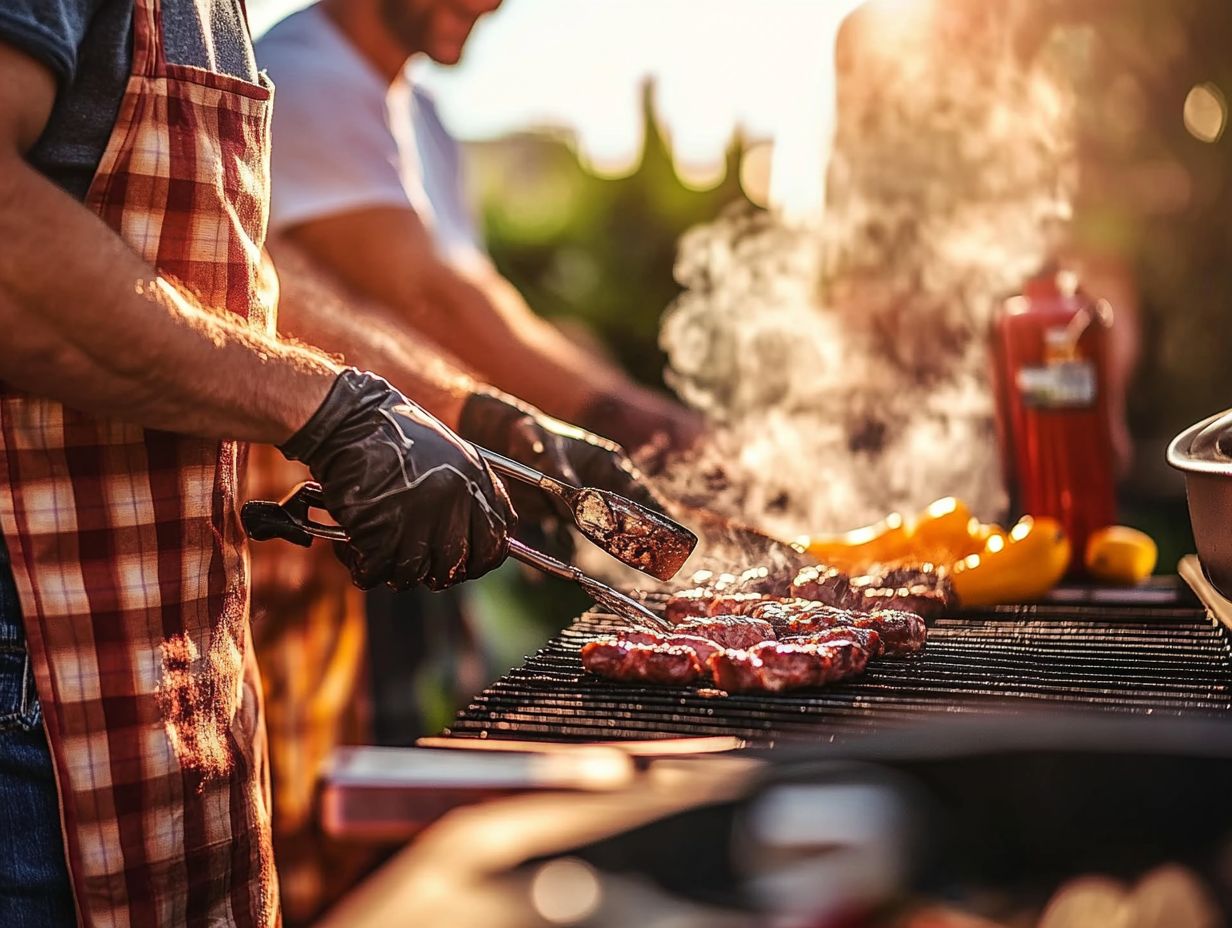
Ready to grill safely? Here are top tips for beginners!
- Stay prepared! Always keep a fire extinguisher nearby to tackle any emergencies.
- Handle hot grills and utensils with oven mitts or heat-resistant gloves.
- Keep all flammable materials, such as paper plates and napkins, away from your cooking area.
- Never leave your grill unattended while it is in use.
- Use long-handled tools to maintain a safe distance from the heat source.
- Ensure proper cleaning and maintenance of your grill to prevent any potential hazards. Tips from experts like Virginia Tech can enhance your grilling experience.
How can I ensure food safety while cooking outdoors with insights from professionals like Melissa Wright?
- Wash your hands before and after handling raw meat, and use separate utensils for raw and cooked foods.
- Marinate meat in the refrigerator, not at room temperature.
- Use a meat thermometer to ensure meat is cooked to the appropriate temperature.
- Keep food covered and in the shade to prevent bacteria growth.
- Discard any leftover marinades that have come into contact with raw meat, as maintaining a clean environment is critical for food safety.
- Pack and store food in a cooler with plenty of ice to keep it at a safe temperature.
What should I do if a grease fire occurs on my grill?
- Turn off the grill and keep the lid closed to smother the fire.
- If the grease fire is small, use a fire extinguisher or baking soda to put it out.
- Do NOT use water to extinguish a grease fire, as it can cause the fire to spread.
- If the fire is too large to handle on your own, call 911 for assistance.
- Once the fire is out, do not open the grill until it has completely cooled down.
- Thoroughly clean the grill before using it again.
Are there any safety precautions I should take when using a charcoal grill?
- Use only charcoal starter fluid and not gasoline or other flammable liquids to ensure safety while using your charcoal grill.
- Wait for the coals to fully cool down before disposing of them in a metal container.
- Do not add more charcoal to the grill once it is lit.
- Use a long-handled lighter or matches to light the charcoal.
- Do not leave the grill unattended while it is lit.
- Always keep a fire extinguisher nearby in case of any accidents.
What are some general tips for a safe outdoor cooking experience?
- Choose a level and stable surface to set up your grill.
- Ensure your cooking area is well-ventilated to avoid carbon monoxide buildup.
- Keep children and pets away from the cooking area, especially when preparing meals that require careful attention.
- Wear appropriate clothing to protect yourself from heat and potential spills.
- Use a timer or keep track of cooking times to prevent food from burning.
- Clean up any spills or messes immediately to prevent slips and falls.
What are some precautions to take when cooking outdoors in extreme weather conditions, particularly if using a grill in Salt Lake City?
Avoid cooking outdoors in heavy rain or strong winds.
Move your grill to a safe location if there s lightning risk.
Use a grill cover to keep snow or ice away.
Monitor your grill closely and adjust settings in extreme temperatures.
Create a backup plan for severe weather. Consider moving indoors or using a heavy pot for slow cooking, known as a Dutch oven.
Your safety comes first! Don t take risks for outdoor cooking.

